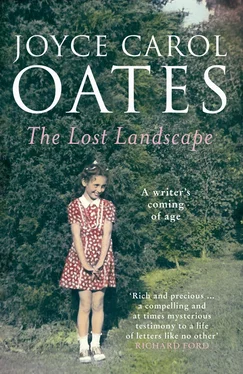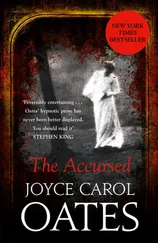I WAS HER PETchicken. I was Happy Chicken.
Of all the chickens on the little farm on Transit Road in the northern edge of Erie County in western New York State in that long-ago time in the early 1940s, just one was Happy Chicken who was the curly-haired little girl’s pet chicken.
The little girl was urged to think that she’d been the first to call me Happy Chicken. In fact, this had to have been one of the adults and probably the Mother.
Probably too it was the Mother, and not the little girl, who’d been the first to discover that of all the chickens, I was the only one who came eagerly clucking to the little girl as if to say hello.
Oh look!—it’s Happy Chicken coming to say hello.
The little girl and the little girl’s mother laughed in delight that, without being called, I would peck in the dirt around the little girl’s feet and I would seem to bow when my back was lightly stroked as a dog or a cat might seem to bow when petted.
The little girl loved it, my feathers were soft . Not scratchy and smelly like the feathers of the other, older chickens.
The little girl loved hearing my soft, querying clucks.
Early in the morning the little girl ran outside.
Happy! Happy Chicken!—the little girl cried through small cupped hands.
And there I came running! Out of the shadowy barn, or out of the bushes, or from somewhere in the barnyard amidst other, ordinary dark-red-feathered chickens. A flutter of feathers, cluck-cluck-cluck lifting in a bright staccato Here I am! I am Happy Chicken!
The Grandfather shook his head in disbelief. Never saw anything like this— Damn little chicken thinks he’s a dog.
It was a sign of how special Happy Chicken was, the family referred to me as he . As if I were, not a mere hen among many, a brainless egg-layer like the others, but a lively little boy-chicken.
For the others were just ordinary hens and scarcely discernible from one another unless you looked closely at them which no one would do (except the Grandmother who examined hens suspected of being “sickly”).
Truly I was Happy Chicken! Truly, there was no other chicken like me.
My red-gleaming feathers bristled and shone more brightly than the feathers of the hens because I didn’t roll in the dust as frequently as they did, in their (mostly futile) effort to rid themselves of mites. It wasn’t just that Happy Chicken was young (for there were other chickens as young as I was, hatched from eggs within the year) but I was also far more intelligent, and more handsome; your eye was drawn to me, and only to me, out of the flock; for you could see from the special gleam in my eyes and the way in which I came running before the little girl called me, that I was a very special little chicken.
The yard between the barn and the farmhouse was cratered with shallow indentations in which chickens rolled and fluttered their wings like large demented birds who’d lost the ability to fly. Sometimes as many as a dozen chickens would be rolling in the dirt at the same time as in a bizarre coordinated modern dance; but the chickens were not coordinated and indeed took little heed of one another except, from time to time, to lash out with a petulant peck and an irritated cluck. When not rolling in the dirt (and in their own black, liquidy droppings) these chickens spent their time jabbing beaks into the dirt in search of grubs, bugs. Stray seeds left over from feeding time, bits of rotted fruit. Their happiness was not the happiness of Happy Chicken but a very dim kind of happiness for a chicken’s brain is hardly the size of a pea, what else can you expect? This was why Happy Chicken—that is, I—was such a surprise to the family, and such a delight.
My comb was rosy with health, erect with blood. My eyes were unusually alert and clear. But each eye on each side of the beak, how’d you expect us to see coherently? We see double, and one side of our brain dims down so that the other side can see precisely. That’s how we know which direction in which to run, to escape predators.
Most of the time, however, most chickens don’t. Don’t escape predators.
Sometime, they’re so dumb they run toward predators . They do this when the predator is smart enough to freeze. They can’t detect immobility, and they can’t detect something staring at them.
I was not really one of them . To be identified as special, and recognized as Happy Chicken, meant that, though I was a chicken I was not one of them . And particularly, I was not a silly stupid hen.
SOMETIMES—AT SPECIAL TIMES—UNDER CLOSEadult scrutiny and always held snug in the little girl’s arms—Happy Chicken was allowed inside the farmhouse.
No other chicken, not even Mr. Rooster, was ever allowed inside the farmhouse.
Never upstairs but downstairs in the “wash-room” at the rear of the house—a room with a linoleum floor that contained a washing machine with a hand ringer, and where coats and boots were kept—this is where the little girl Joyce could bring me. But always held gently-but-firmly in her arms, or set onto the floor and held in place, in the wash-room or—a few special times—in the kitchen which opened off the wash-room, where the Grandmother spent most of her time. Here, the little girl was given scraps of bread to feed me, on the linoleum floor.
And here, I was sometimes allowed up in the little girl’s lap, to be fussed over and petted.
The other chickens would’ve been jealous of me—except they were too stupid. They didn’t know . Even Mr. Rooster didn’t understand how Happy Chicken was privileged. Sometimes Mr. Rooster stationed himself at the back door of the farmhouse, clucking and preening, complaining, fretting, fluttering his wings, insisting upon the attention of everyone who went inside the house, or came outside, shamelessly looking for a treat, and when he didn’t get a treat, squawking indignantly and threatening to peck with his sharp beak.
The little girl was frightened of Mr. Rooster, and hurried past him. The Mother and the Grandmother shooed Mr. Rooster away, for they were frightened of him, too. The Grandfather and the Father laughed at Mr. Rooster and gave him a kick. They thought it was very funny, a goddamn bird trying to intimidate them.
Sometimes Happy Chicken was allowed in the wash-room overnight, in a little box filled with straw, like a nest. And little Joyce petted me, and fussed over me, and fed me special treats.
Happy Chicken! You are so pretty.
. . . you are so nice . I love you
Happy Chicken. I love you.
The little girl whispered to me, that no one else could hear. The little girl had many things to tell me, all kinds of secrets to tell me, whispered against the side of my head where (the little girl supposed) I had “ears”—and when I made a clucking noise, the little girl spoke to me excitedly, for it seemed to the little girl that I was talking to her, and telling her secrets.
What are you and Happy Chicken always talking about, the Mother asked the little girl, but the little girl shook her head defiantly, and would not tell.
(Sometimes, there was an egg or two discovered in Happy Chicken’s little nest. The little girl took these eggs away to give to the Grandmother for they were special Happy Chicken eggs not to be mixed with the eggs of the hens out in the coop.)
(Yet still, though Happy Chicken produced eggs, it seemed to be taken for granted that Happy Chicken was a boy-chicken . For always, Happy Chicken was he, him. )
Читать дальше












